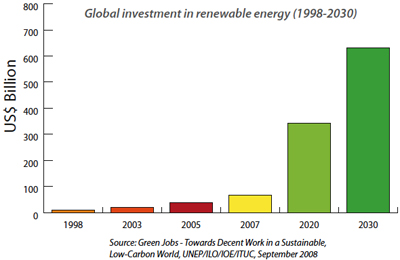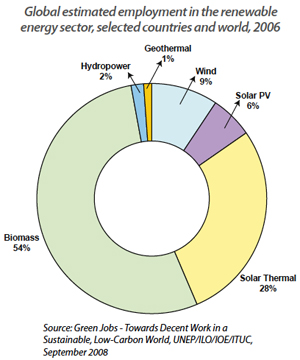Green New Deal will spark global economy, create jobs
mongabay.com
October 22, 2008
A “Global Green New Deal” that focuses the world economy “towards investments in clean technologies and ‘natural’ infrastructure such as forests and soils is the best bet for real growth, combating climate change and triggering an employment boom,” according to a new initiative led by the United Nations Environment Programme (UNEP).
“The financial, fuel and food crises of 2008 are in part a result of speculation and a failure of governments to intelligently manage and focus markets,” said Achim Steiner, UN Under-Secretary General and UNEP Executive Director. “But they are also part of a wider market failure triggering ever deeper and disturbing losses of natural capital and nature-based assets coupled with an over-reliance of finite, often subsidized fossil fuels.”
“The flip side of the coin is the enormous economic, social and environmental benefits likely to arise from combating climate change and re-investing in natural infrastructure — benefits ranging from new green jobs in clean tech and clean energy businesses up to ones in sustainable agriculture and conservation-based enterprises.”
 Global investment in renewable energy (1998-2030) |
The $4 million Green “Economy Initiative” aims to stimulate job growth and boost the quality of life for the world’s poor by re-orienting the focus of global economic policy towards a more environmentally-friendly economy based on clean energy and technologies; sustainable agriculture; ecosystem infrastructure; reduced emissions; and sustainable urban planning. UNEP says the initiative plans to deliver within two years a comprehensive guide on how to make the transition.
“Transformative ideas need to be discussed and transformative decisions taken. The alternative is more boom and bust cycles; a climate-stressed world and a collapse of fish stocks and fertile soils up to forest ecosystems — vast, natural ‘utilities’ that for a fraction of the cost of machines store water and carbon, stabilize soils; sustain indigenous and rural livelihoods and harbor genetic resources to the value of trillions of dollars a year,” said Steiner.
 Global estimate employment in the renewable energy sector in 2006 |
“The economic models of the 20th century are now hitting the limits of what is possible — possible in terms of delivering better livelihoods for the 2.6 billion people still living on less than $2 a day and possible in terms of our ecological footprint,” added Pavan Sukdhev, a senior banker from Deutsche Bank who is helping develop the initiative.
“Investments will soon be pouring back into the global economy — the question is whether they go into the old, extractive, short-term economy of yesterday or a new green economy that will deal with multiple challenges while generating multiple economic opportunities for the poor and the well-off alike.”
The Green Economy Initiative draws on the New Economics Foundation’s “A Green New Deal: Joined-up policies to solve the triple crunch of the credit crisis, climate change and high oil prices” report released in July.
Green Jobs: Towards Decent Work in a Sustainable, Low-Carbon World
The dual challenge in numbers
Box from the UNEP report
Environmental challenge
- Climate?related disasters: 262 million people affected annually over the period 2000-2004
- Water shortages: 1.8 billion expected to suffer from fresh water scarcity by 2025, mostly in Asia
and Africa - Environmental refugees: 50 million people potentially forced to become environmental refugees
by climate change over the next few years - Displacement by flooding: 330 million people increasingly exposed to flooding in coastal areas,
flood plains of rivers and small island States - Food shortages and malnutrition: currently affect 180 million people and threaten to affect 600
million people by 2080 - Pollution: 2 million premature deaths globally each year due to indoor and outdoor air pollution
- Loss of biodiversity: the great majority of well-studied species are declining in distribution,
abundance or both. Biological products and processes make up 40 per cent of the global
economy. Poor people, especially those living in areas of low agricultural productivity, depend
heavily on the genetic diversity of the environment
Decent work challenge
- Working poor: 1.3 billion in the world with earnings too low to lift them and their dependants
above the poverty threshold of $2 per day (more than 43 per cent of the global workforce) - Unemployed: 190 million globally
- Young job seekers: over 500 million additional job?seekers over the next 10 years
- Insecurity: 5.3 billion people without access to any social security coverage
- Access to energy: 1.6 billion people without access to modern energy (almost 1 in 4 humans
living today) - Adequate housing: 1 billion slum dwellers in poor housing lacking essential facilities such as
clean water and sanitation